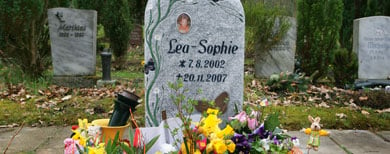“There is no worse punishment for a person than the loss of a daughter,” said the girl’s 26-year-old father at during a press conference before the trial began in Schwerin. “I have failed as a father.”
Prosecutors from the northern German state of Mecklenburg-Western Pomerania accuse the parents, who live from welfare benefits, of having been “merciless” and “unfeeling” to their daughter. They are charged with murder by neglect. Prosecutors say Lea-Sophie didn’t get enough to eat or drink after the birth of her brother in September 2007.
When she was hospitalized shortly before her death, she only weighed 7.4 kilogrammes, just half of what a healthy child her age should. An autopsy showed that she died of starvation, dehydration and painful ulcers.
Lea-Sophie’s father claims that he had left most of the responsibility for his daughter up to the girl’s 24-year-old mother, and he called the ambulance against her will after they found the her unresponsive upon returning home from a walk with her 2-month-old brother and the two family dogs.
According to police investigation, the infant boy, the apartment, and the house pets were all well cared for by the couple. The parents allegedly abused the child and left her on her own. But several reports to child services were reportedly only met with half-hearted reactions by the authorities.
Prosecutors said the already chronically malnourished girl’s situation worsened dramatically after her brother was born. Her father confirmed that she reacted to the birth with behavioral problems, refusing food and throwing toys at her brother.
“All appeals to her reason were unfruitful,” her father said. “I hoped that things would get better on their own.”



 Please whitelist us to continue reading.
Please whitelist us to continue reading.